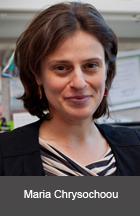 Dr. Marisa Chrysochoou, an assistant professor of Civil & Environmental Engineering, has been awarded a prestigious Marie Curie International Incoming Fellowship (IIF) that will embed her at the National Technical University of Athens for two years, where she will share her expertise on chromium contamination and specialized experimental techniques with an interdisciplinary team of colleagues who are investigating a large chromium plume in central Greece.
Dr. Marisa Chrysochoou, an assistant professor of Civil & Environmental Engineering, has been awarded a prestigious Marie Curie International Incoming Fellowship (IIF) that will embed her at the National Technical University of Athens for two years, where she will share her expertise on chromium contamination and specialized experimental techniques with an interdisciplinary team of colleagues who are investigating a large chromium plume in central Greece.
The goal of the IIF program is to bring researchers from outside the European Union to universities in EU countries, where they share their expertise with researchers at the host university while also building collaborative bridges.
Dr. Chrysochoou explained the invitation was based on her ongoing, 10-year investigations involving chromium contamination of soil and groundwater. Hexavalent chromium (Cr VI), which is both highly toxic and a known cancer-causing agent, is used commonly in leather tanning, metal plating, cement manufacture and other industries. In an ironic twist, trivalent chromium (Cr III) is required by humans for the metabolism of sugar.
“Chromium is a big problem in Greece because of the natural geology of the land and in many cases, due to industrial pollution. There are high levels of chromium in the groundwater and irrigation water. I will continue my research there, to assist environmental, civil and materials scientists in understanding the sources and fate of chromium contamination through specialized geochemical analyses and development of models that predict the chromium interaction with soil components. Ultimately, we will be using these tools to optimize remediation treatments for the removal of the chromium.”
“I’m very excited about this opportunity. I have been working on this problem for many years. It is both scientifically challenging and a practical problem; it will be very rewarding to contribute toward solving the chromium contamination problem in Greece,” she said.
With expertise in the speciation, characterization and remediation of heavy metals, Dr. Chrysochoou has developed substantial experience with chromium. Among her funded projects at UConn is one aimed at helping the National Chromium Company, located in Putnam, CT, to remediate soil and groundwater contamination beneath one of the company’s buildings. She is also currently involved in collaborative studies with researchers at various institutions to utilize advanced spectroscopic and computational techniques to improve current understanding of chromium behavior in the subsurface.
Dr. Chrysochoou will share her extensive expertise in chromium characterization and remediation, from modeling and lab testing to field applications, with her new colleagues at the National Technical University of Athens. She expects to begin her overseas IIF in mid-June.



